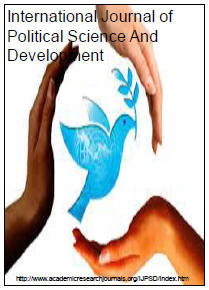| IJPSD |
International
Journal of Political Science and Development |
||||||||||||||||||||||
|
International Journal of Political Science and Development Vol. 3(2), pp. 63–78, February, 2015. DOI: 10.14662/IJPSD2015.005 ISSN: 2360-784X
Research Paper
Principal-Agent Problems: Why War Strategy Doesn’t Always Match Policy Aims1
Bryan Groves
201 Science Drive, Durham, NC 27708. E-mail: bryan.groves@duke.edu
Accepted 7 February 2015 1 The views expressed herein are those of the author and do not necessarily reflect the position of the U.S. Department of Defense, the Department of the Army, the Combined Arms Center or the School of Advanced Military Studies at Fort Leavenworth, or Duke University.
Policy-strategy alignment in war gives the military the best chance of
accomplishing national objectives without wasting lives. Thus, ensuring
military endeavors are synchronized within the nation’s broader
political goals—not working at cross purposes—is vital. However,
mismatches between American policy and strategy have occurred, sometimes
due to principal-agent problems. This paper demonstrates that in the
most important Post-Cold War cases, when the principal (the president)
failed to control the agent (the military), the country failed to align
its military strategy with its policy objectives. More importantly, this
failure appears to correspond with less successful war outcomes. The
unique contribution of this paper is two-fold. First, it provides a
critical cross case comparison of policy-strategy linkage through the
lens of principal-agent theory, and its impact on war outcomes. Second,
it offers a menu of possible policy prescriptions to address
principal-agent problems to include biannual congressional hearings,
multiple advocacy, and increased civil-military interactions.
Implementation of these recommendations will: (1) improve the
civil-military principal-agent relationship, (2) facilitate the
connection of wartime strategy with its corresponding policy, and (3)
provide the best opportunity for successful war outcomes. Cite This Article As: Groves B (2015). Principal-Agent Problems: Why War Strategy Doesn’t Always Match Policy Aims. Inter. J. Polit. Sci. Develop. 3(2): 63-78.
|
|
|||||||||||||||||||||
